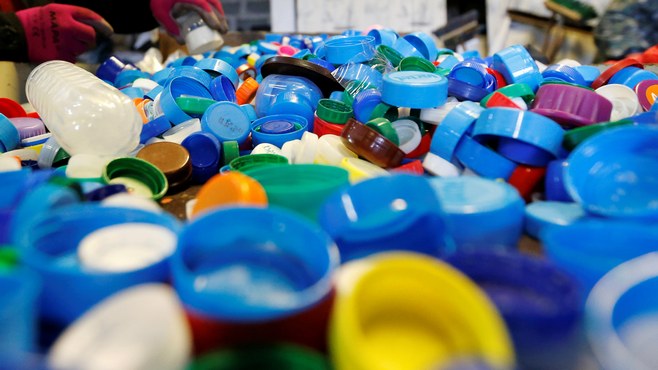- The problem of marine pollution due to plastic litter was expected to garner attention at the Osaka G20 as an important issue for the international community, and hopes were that Japan as chair would demonstrate leadership in this regard.
- The G20 Implementation Framework for Actions on Marine Plastic Litter and the Osaka Blue Ocean Vision were respectively adopted in the G20 Ministerial Meeting on Energy Transitions and Global Environment for Sustainable Growth and the G20 Osaka Leaders' Declaration, signifying that agreement had been reached on a goal of reducing additional pollution due to marine plastic litter to zero by 2050.
- To achieve this goal and steadily reduce marine plastic litter, effective frameworks should be bolstered and countermeasures carefully implemented in Japan, and Japan's waste disposal systems should be put to good use in improving the disposal capabilities of countries in Asia and elsewhere.
The issue of maritime pollution due to plastic litter garnered attention at the G20 Summit held in Osaka in June of this year. Japanese government officials, together with their US counterparts, drew international criticism at last year's G7 summit for refusing to sign on to the Ocean Plastics Charter that included numerical targets for reducing plastic litter, and Japan was urged to exercise leadership on this issue at the G20. Accordingly, the government presented its Plastic Resource Recycling Strategyi on May 31 and went into the G20 meeting advocating proper processing and 3R initiatives within Japan and greater contributions internationally.
As much as eight million tons of plastic are currently thrown into the sea each year, and oceans are now polluted with 150 million tons of plastic litter. It has been forecast that, by 2050, this plastic waste will be equivalent in volume to all the fish in the oceansii. Concerns have also been raised about the impacts of microplastics less than 5mm in size, and the adverse effects of microplastics on ecosystems and the health hazards posed by eating seafood from such ecosystems present new environmental risks.
The world's annual production of plastic has grown twenty-fold over the past 50 years. The plastic flushed into the oceans comes mainly from China, Indonesia, the Philippines and other Asian countriesiii, and Japan ranks second only to the US in per capita volume of plastic litter.
The dirty plastic waste generated by Japan and developed Western countries has been exported primarily to Asian countries in the name of resource recycling, but the inadequate processing capabilities of many Asian countries have resulted in numerous examples of unrecycled plastic being discarded into the ocean. Recycling and incineration/landfill disposal have not kept pace with the expansion of plastic litter, and plastic that has not been properly processed or that has been intentionally discarded finds its way from rivers and beaches into the sea. It is essential that efforts be made to reduce the use of plastic, particularly single-use plastic, from which the marine plastic litter derives.
The G20 Ministerial Meeting on Energy Transitions and Global Environment for Sustainable Growth reached agreement on creating an international framework — the G20 Implementation Framework for Actions on Marine Plastic Litteriv — under which G20 countries would implement voluntary countermeasures to reduce marine plastic litter and continuously report and share information on their efforts.
The G20 Osaka Leaders' Declarationv also stated: "…we share, and call on other members of the international community to also share, as a common global vision, the "Osaka Blue Ocean Vision" that we aim to reduce additional pollution by marine plastic litter to zero by 2050 through a comprehensive life-cycle approach…" Bolstering effective frameworks that help achieve this goal and that lead to steady reductions in marine plastic litter is an issue that must be addressed in future.
Revisions to the Basel Convention proposed by the Japanese and Norwegian governments that would subject the cross-border transport of dirty plastic waste to the same restrictions applied to that of toxic waste were adopted in May of this year. Henceforth, plastic litter not suited for recycling will be designated toxic waste, and exports of such waste without the consent of the receiving countries will be banned. The signatory countries are seeking to shrink the production of plastic litter to a minimum and to have this litter processed domestically as far as possible.
It is vital, too, that Japan's exceptional systems and know-how covering the full spectrum from the collection of litter to its processing be put to good use in improving the processing capabilities of Asian countries.
Kazuo Matsushita is Professor Emeritus, Kyoto University and Senior Fellow, Institute of Global Environmental Strategies (IGES).
i Plastic Resource Recycling Strategy: https://www.env.go.jp/press/files/jp/111747.pdf
ii Id.
iii Ministry of Environment, Japan, "The Marine Plastic Litter Issue" (February 2019)
iv G20 Implementation Framework for Actions on Marine Plastic Litter
https://www.env.go.jp/press/files/jp/111882.pdf
v G20 Osaka Leaders' Declaration
https://www.g20.org/en/documents/final_g20_osaka_leaders
_declaration.html
The views expressed in this piece are the author's own and should not be attributed to The Association of Japanese Institutes of Strategic Studies.



